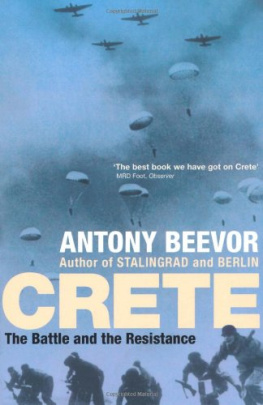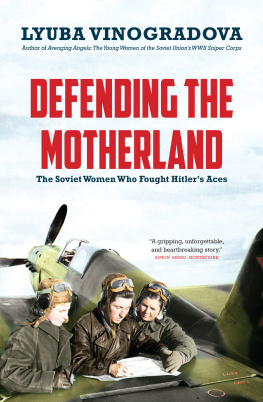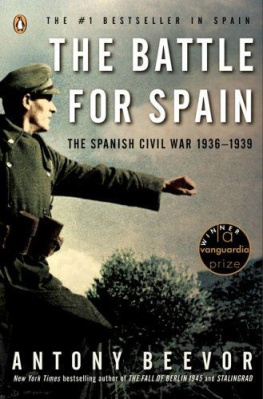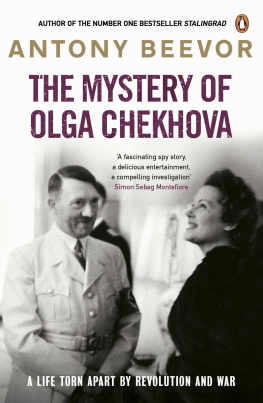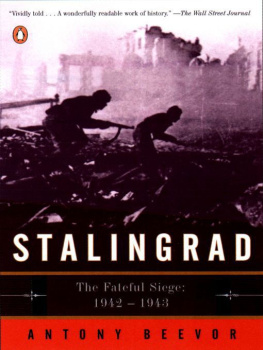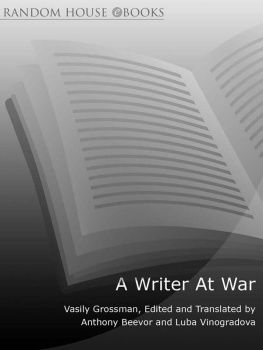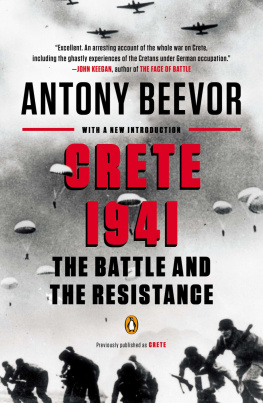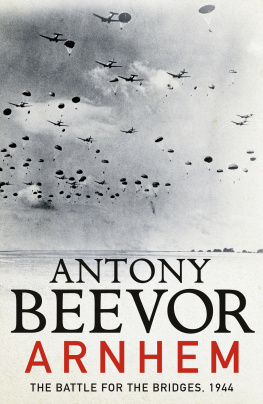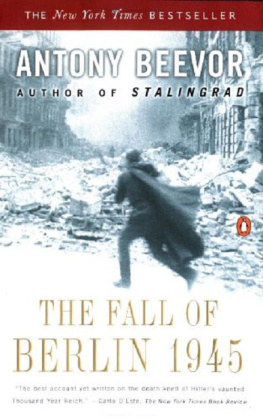Antony Beevor - Crete: The Battle and the Resistance
Here you can read online Antony Beevor - Crete: The Battle and the Resistance full text of the book (entire story) in english for free. Download pdf and epub, get meaning, cover and reviews about this ebook. year: 1994, publisher: Westview, genre: Non-fiction. Description of the work, (preface) as well as reviews are available. Best literature library LitArk.com created for fans of good reading and offers a wide selection of genres:
Romance novel
Science fiction
Adventure
Detective
Science
History
Home and family
Prose
Art
Politics
Computer
Non-fiction
Religion
Business
Children
Humor
Choose a favorite category and find really read worthwhile books. Enjoy immersion in the world of imagination, feel the emotions of the characters or learn something new for yourself, make an fascinating discovery.
- Book:Crete: The Battle and the Resistance
- Author:
- Publisher:Westview
- Genre:
- Year:1994
- Rating:5 / 5
- Favourites:Add to favourites
- Your mark:
- 100
- 1
- 2
- 3
- 4
- 5
Crete: The Battle and the Resistance: summary, description and annotation
We offer to read an annotation, description, summary or preface (depends on what the author of the book "Crete: The Battle and the Resistance" wrote himself). If you haven't found the necessary information about the book — write in the comments, we will try to find it.
Crete: The Battle and the Resistance — read online for free the complete book (whole text) full work
Below is the text of the book, divided by pages. System saving the place of the last page read, allows you to conveniently read the book "Crete: The Battle and the Resistance" online for free, without having to search again every time where you left off. Put a bookmark, and you can go to the page where you finished reading at any time.
Font size:
Interval:
Bookmark:
Crete
The Battle and the Resistance
Anthony Beevor
John Murray
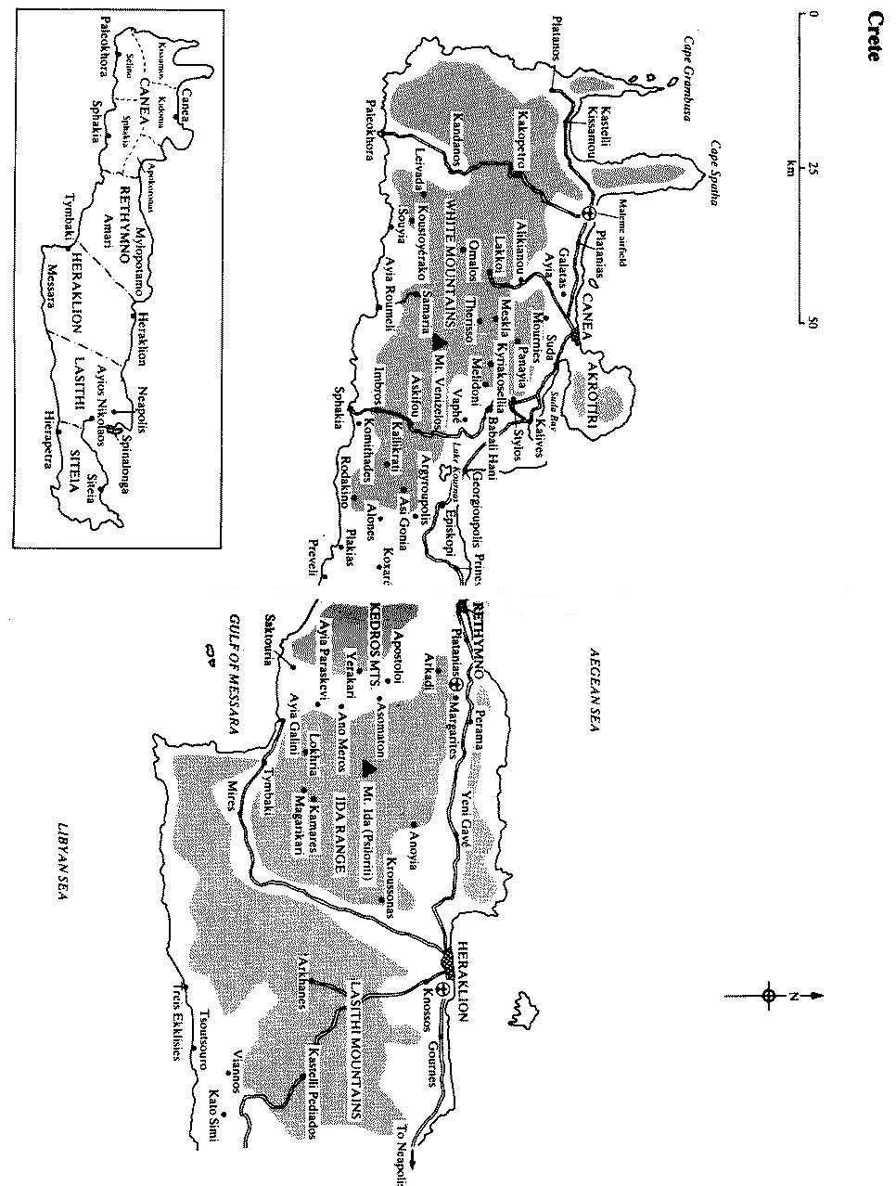
During my research, I soon learned that one should not be dismayed when people warn you that they have little of interest to offer. Sometimes a lapse of memory would be blamed what Paddy Leigh Fermor calls 'a shot across the bows from Admiral Alzheimer' yet those who promised little were always the ones who, often surprising themselves as much as their listener, suddenly recalled, with great clarity, incidents and individuals from half a century ago. Without their stories and insights, this book would have been very flat.
I am above all grateful to: Miki Akoumianakis, the late Lord Caccia, Dennis Ciclitira, Sir Geoffrey Cox, Xan Fielding, Ron Fletcher, Major General Michael Forrester, Hugh Frser, Professor Nicholas Hammond, Professor Freiherr von der Heydte, Myles Hildyard, Brigadier R.W. Hobson, Lord Hollenden, Sir David Hunt, Lieutenant General Sir Ian Jacob, Manolis Kougoumtzakis, Patrick Leigh Fermor, Manoussos Manoussakis, Colonel Guy May, Sir Charles Mott-Radclyffe, Mark Norman, George Psychoundakis, John Pumphrey, Brigadier Ray Sandover, Jack Smith-Hughes, John Stanley, Ralph Stockbridge, Dr R.E.S. Tanner, the Rt. Rev. Stephen Verney, Michael Ward, Sir Peter Wilkinson, Gerry de Winton and the Hon. CM. Woodhouse.
Many thanks are also due to Vincent Williams, President of the UK Crete Veterans Association, and to UKCVA members and those of allied associations who contributed their memories: Tom Barratt, Tom Bevan, R.B. Brown, J.W. Clayton, Horace Cowley, Alexander Dow, Lieutenant Commander T.J. Gibbons, Alfred Gotts, Lieutenant Commander F.M. Hutton, Clifford Pass, Kenneth Stalder and Norman Swift; and to Vassilios Fourakis and Eleutheris Tsinakis.
I would also like to thank those who have helped in other ways, whether generously sharing their own research, contributing items from unexpected sources or providing useful ideas for further delving: Joan Bright Astley, Evangelos Christou, Antony Contomichaelos, Michael Davie, M.R.D. Foot, Imogen Grundon, Edward Hodgkin, Penelope Hope, Charles Messenger, Bernard Redshaw, Hugo Vickers and Christopher Woods.
I owe a great debt to those who aided my research in Greece and made it so enjoyable: John Craxton in Canea; Marion Tzanakis, the British Consul in Heraklion; Captain Richard Evans RN, the Naval and Air Attache at the British Embassy in Athens; HE Richard Woods, New Zealand Ambassador to Greece; and Admiral Evangelos Sakellariou and Lieutenant Colonel Mountakis and their staff at the War Museum in Athens.
I am also very grateful to all those who have lent me letters, diaries, photographs and especially unpublished reports, a number of which have proved not just helpful, but vital. Hugh Frser, a member of the British Military Mission in Crete, has been extremely generous with his time in devilling and translating useful documents and accounts of the resistance. Dr Detlef Vogel of the Military History Research Institute in Freiburg has kindly sent me copies of relevant German documents and passed on points arising from his own work on the subject.
Those with first-hand or expert knowledge who read and criticized chapters not only saved me from error, but in many cases added further illumination. I am particularly grateful to Commander Edward Thomas for examining all the Ultra-related sections, to Major General Michael Forrester, to Lord Jellicoe for looking at all the passages about SAS and SBS raids, and to all those members of the British Military Mission in Crete and Manoussos Manoussakis who also read Part Three, in some cases several times, and rang round their network of resistance colleagues in Greece double-checking incidents described in the text. Any mistakes which remain are, of course, entirely my responsibility.
My greatest thanks are reserved for my wife, Artemis. Without her help, I would never have managed this book.
Military Missions
On the night after the last British troops left the beaches of Dunkirk, a tall man with a glass eye said goodbye to his wife on the steps of the Oxford and Cambridge Club. It was the eve of his departure by flying-boat for Greece. They never saw each other again. A year later, badly wounded in the battle for Crete, he was propped against a wall by German paratroopers and shot.
Although an archaeologist, and an Old Wykehamist of conventional background, John Pendlebury was a vigorous romantic. He carried a swordstick which he claimed was the perfect weapon against parachutists. In Crete it became an even more famous trademark than the glass eye which he used to leave on his desk to indicate his absence from Heraklion whenever he left for the mountains to confer with guerrilla kapitans.
Like many dons and archaeologists, he had been canvassed in 1938 by a special department in the War Office known as MI(R) Military Intelligence (Research) a forerunner of Special Operations Executive. With an intimate knowledge of Crete from his time as curator at Knossos in the mid-1930s, Pendlebury was an obvious candidate for special operations. Yet no summons had arrived on the outbreak of war, and he had returned to England for a commission in a cavalry regiment.
The call had finally come in May 1940 as the German attack on the Low Countries and France began.
The increasing possibility of Italy's entry into the war, and German interest in the Balkans, particularly the oilfields of Roumania, suggested that the Eastern Mediterranean would be the next region of operations. Another Greek-speaking archaeologist called to the camouflaged colours of MI(R) in May 1940 was Nicholas Hammond, a don from Cambridge. He and Pendlebury were sent off on a rushed course in explosives, which became Hammond's speciality: an unlikely qualification for a future headmaster of Clifton and professor of Greek. Hammond was an expert on Epirus and Albania. In London, before their departure, Pendlebury insisted more in playfulness than paranoia
that as a security measure they should always converse on the telephone in Greek: Hammond in Epirotic dialect and Pendlebury in Cretan.
Although older than the majority of those volunteering for sabotage and stay-behind groups, Pendlebury was one of the fittest. A well-known athlete from Cambridge, both as a runner and a high-jumper, and a member of the Achilles Club, he had been a friend of Harold Abrahams and Lord Burleigh. In one pre-war season based at Knossos, he had walked over a thousand miles across Crete's mountainous terrain.
At little more than a day's notice, the four members of MI(R) destined for Greece and Albania were summoned to the War Office. They numbered Pendlebury, Hammond, a businessman from Zagreb, and another archaeologist, David Hunt, a fellow of Magdalen College, Oxford, who became a diplomat after the war. On 4 June, they were escorted to Victoria Station by an officer of Foot Guards in full service dress, riding breeches, gleaming boots and No.l Dress cap. In the midst of the stream of exhausted Dunkirk evacuees his immaculate presence provided one of those surreal touches at which the British establishment inadvertently excels.
They boarded a flying-boat in Poole harbour and took off uncertain of their route. The German columns advancing deep into France forced the pilot to take a circuitous line, landing to refuel at Arcachon just south of Bordeaux, Sete, Bizerta, Malta and Corfu. At Athens, all except Pendlebury were refused entry because their covers of 'businessman' and 'civil servant' were thought suspicious.
During that period preceding the Italian invasion, the Greek government was on guard against any British action which might compromise its neutrality.
Next pageFont size:
Interval:
Bookmark:
Similar books «Crete: The Battle and the Resistance»
Look at similar books to Crete: The Battle and the Resistance. We have selected literature similar in name and meaning in the hope of providing readers with more options to find new, interesting, not yet read works.
Discussion, reviews of the book Crete: The Battle and the Resistance and just readers' own opinions. Leave your comments, write what you think about the work, its meaning or the main characters. Specify what exactly you liked and what you didn't like, and why you think so.

